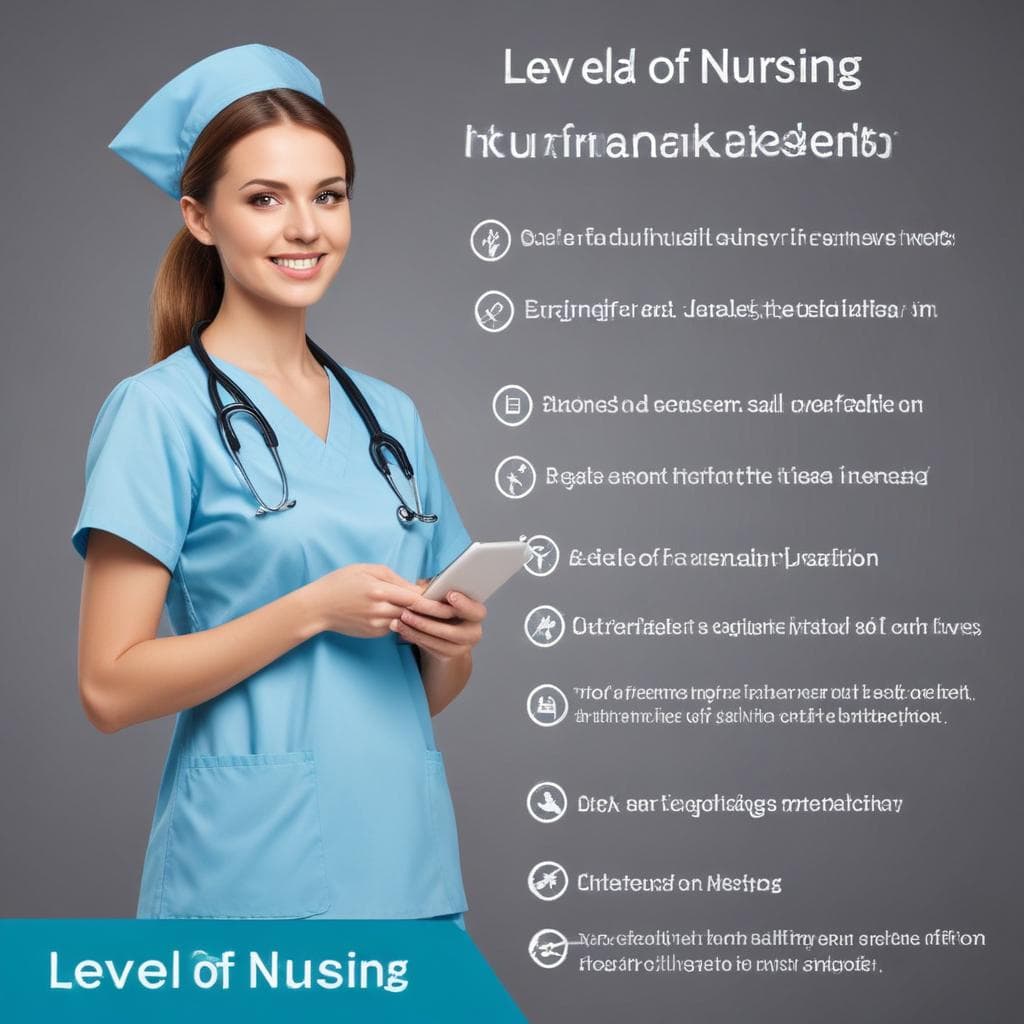Have you considered being a nurse or do you want to improve your current nursing occupation? It is very important that you understand the different levels of a nurse in order to plan your career path. The nursing profession has different categories from certified nursing assistants (CNA’s) up to advanced practice registered nurses (APRN); hence, a scope of growth and specialisation.
This complete guide will take us through the steps for a nursing hierarchy, starting from introductory positions and ending with higher degrees in nursing. This article is intended for students considering nursing as their future career or registered nurses who are thinking of taking further studies beyond RN level. You will find this paper useful if you are looking for ways on how to advance your career in the field of Nursing or when making decisions on whether to enrol for a degree program or not.

The education requirements, duties and possible paths associated with each level of nurses shall be dealt with. You will discover how to scale up your way through the chain of command for nursing within healthcare settings plus get a clear picture of how it can be done by learning about the chain of command for several nurses. By the time you finish reading this guide, not only will you have been exposed to various nursing levels in order, but also would have gained valuable insights that might come in handy when making choices regarding your personal future as far as this career path is concerned.
So let’s rush into an exploration of what they call “Nursing” which happens to be one very interesting profession.
Certified Nursing Assistant (CNA)
Table of Contents
ToggleCertified nursing assistants are usually called CNAs. Patient care is basically built around these individuals in various healthcare settings. These committed professionals perform a crucial role within the nursing hierarchy providing direct care and support to patients under the supervision of licensed practical nurses (LPN) and registered nurses (RN).
Education and Training:
For those who want to pursue a career in nursing, starting as CNA is a great way to go. The usual progression into becoming a CNA includes
- Completion of a state-approved CNA program that typically lasts from four to twelve weeks
- Acquisition of practical skills through clinical experience
- Passing the State’s Competency Exam.
Responsibilities
C.N.A.s have very essential tasks which directly affect patient comfort and well-being. Their responsibilities often involve but not limited to:

- Helping patients with day-to-day personal hygiene such as bathing, dressing and eating
- Recording vital signs
- Moving patients safely between beds and wheelchairs
- Answering call buttons from patients with basic needs
- Keeping patient environments clean and safe
Career Advancement
In many cases, nurses begin their career by working as CNAs in order to get practical experience before advancing their nursing education. The role of CNA is usually a starting point for attaining knowledge on patient care and could be the first step towards becoming an LPN or RN. One way of getting into the nursing field and deciding whether nursing is right for you is by training as a CNA. It provides you an opportunity to learn through practice while having a real impact on people’s lives, as well as an insight into how health systems function at the most basic level.
Licensed Practical Nurse (LPN) or Licensed Vocational Nurse (LVN)
The next level of the nursing career ladder is referred to as Licensed Practical Nurses (LPNs) but in some states they are sometimes called Licensed Vocational Nurses (LVNs). In the nursing hierarchy, these skilled professionals fill up the gap between CNAs and Registered Nurses (RNs) and play a vital part in patient care.
Education and Training
To be an LPN/LVN, you need more advanced nursing training than what a CNA has. The steps usually involve
- Completion of a state approved practical nursing program that normally takes 12-18 months
- Acquiring supervised practice clinical experience
- Passing the National Council Licensure Examination for Practical Nurses (NCLEX-PN)
Responsibilities
CNAs bear less complicated duties than LPNs/LVNs who work under RNs and doctors. Their responsibilities often include
- Giving drugs and injections
- Putting on bandages and placing tubes into patients’ bodies
- Checking patients’ health status daily with reporting any changes
- Taking samples for testing
- Teaching patients and their families how to sustain one’s health
Career Advancement
Many LPNs/LVNs choose to go back to school and become RNs. At this point, some nursing colleges offer LPN-to-RN bridge programs followed by LPN in the nursing career path.
The role of an LPN/LVN is a crucial aspect of the profession since the responsibilities are more and there is deeper knowledge concerning patient care than CNAs. With such a position, one gets experience that is fulfilling and enhances future growth into advanced levels of nursing practice.
Registered Nurse (RN)
RNs are fundamental in the healthcare system, serving as a major stepping stone to other higher levels in nursing. For patient care, these experts with remarkable skills work independently and also involve doctors and other medical professionals whenever they need for collaboration.
Education and training
The attainment of RN status involves more advanced educational programs compared to previous stages of nursing. There are two major avenues:
- Associate Degree in Nursing (ADN) – A 2-3 year program commonly offered at community colleges
- Bachelor of Science in Nursing (BSN) – Four year program available at colleges and universities
- Upon completion of either program, prospective RNs must also:
- Take the National Council Licensure Examination for Registered Nurses (NCLEX-RN)
- Obtain state licensure
Responsibilities
Critical thinking and advanced clinical skills characterise RNs’ wide range of duties. These often include
- Assessing patients’ health conditions
- Developing and implementing nursing care plans
- Administering drugs and therapies
- Operating medical machinery
- Educating patients about their health conditions and how to take care of themselves.
- Supervising LPNs/LVNs and CNAs
Career Advancement
Options in which numerous RNs choose to perform are critical care, oncology or paediatrics units. Others opt to further their education and become APRNs or assume nursing management positions.
RNs are a very important career within the health profession given the role of being directly involved with patients, leadership roles and possibilities to specialise. In spite of changes that may occur in health care delivery systems, nurses will still be needed to contribute their expertise in patient management and act as patient advocates; hence registered nurse role is significant.
Advanced Practice Registered Nurse (APRN)

Advanced Practice Registered Nurses (APRNs) are the highest level of nursing practice in direct patient care. These professionals are highly skilled and have advanced training and education, exceeding the level of a Registered Nurse (RN), to enable them to undertake complex responsibilities within healthcare.
Education and Training
To become an APRN involves significant commitment to education and clinical practice
- BSN (Bachelor of Science in Nursing)
- Experience as an RN
- Master’s or DNP program
- Certification by specialty nationally
- State licensure as APRN
Types of APRNs
Each type of APRN has a different focus, which is distinct from that of the others; there are four types
- NP: This professional gives primary care as well as specialty care and at times becomes the principal caregiver.
- CNS: They help improve nursing practice and patient care for a particular area.
- CNM: Their area of specialisation is women’s health as well as child birth.
- CRNA: They give anaesthesia while managing pain.
Responsibilities
APRNs, as individuals with more knowledge and experience in clinical work can be able to
- Detect and take care of different diseases
- Give prescriptions (where relevant)
- Order and evaluate certain medical tests.
- Conduct some surgeries
- Educate patients through giving them more information about their health conditions
- Research on how nursing practices can be improved
Career Advancement
Direct patient care is the ultimate step on the nursing career ladder for APRNs. They may choose to specialize further in their areas of expertise, acquire leadership skills or contribute to healthcare policies, and research. The APRN role epitomizes clinical practice in nursing since it provides independence, advanced competencies and a great potential for effecting changes in patient care as well as in the whole healthcare system.
Which nursing role is right for you?
Making the right choice concerning a stage in nursing is a huge decision. This could be at the beginning of one’s career or contemplating on what step to take after being an RN; thus, it is crucial to choose an occupation that matches your aspirations, talents and passions in life. In order to decide which nursing role suits you best, here are things that should be considered
Education and Time Commitment
Think about how much time you can dedicate to nursing training. Ask yourself if you would like shorter programs such as CNA or LPN or longer bachelor degrees like BSN and MSN.

Career Goals
Evaluate where you want to go in your nursing profession in the long run. Are you interested in providing direct patient care only or do you have a passion for leadership, education or specialty roles?
Work Environment
Think about the location you would prefer to work in: hospitals, clinics, schools or community settings. Consider whether you want a fast-paced setting or one with a more routine and stable schedule.
Specialisation Interests
Try out different nursing specialties such as pediatrics, oncology or critical care units. Think about if you are interested in becoming a specialist in any particular area of health care.
Responsibility Level
Make up your mind on how much freedom and decision making authority you would like to have within the scope of your work. Decide if you would rather work independently without anyone supervising your work or under supervision
Salary and Career Advancement
Look at what nurses earn at various levels. Consider each role’s opportunity for growth and career development.
Personal Strengths
Do an evaluation of your abilities and strengths which include communication, critical thinking or leadership qualities. Pick a role that will enable you to use your unique talents
Work-Life Balance
Consider what kind of working hours / lifestyle you desire. Examine ways by which different nursing positions may affect personal life. Many nurses progress through different levels throughout their career. Just because you start at one level, does not mean you cannot move up later. You should take your time to think about it, talk to other nurses who have worked in various roles and sometimes even follow one of them for a day or two in order to know how nursing positions are arranged.
This will enable you to select the nursing role that matches your personal and professional goals and that will guarantee you a satisfying occupation in this well paying profession.
Bottomline
The Nursing occupation provides numerous prospects for personal growth and specialisation. You can be able to plan your career path and advance in the field by understanding different nursing levels. Be it direct patient care, specialised treatment or healthcare leadership, there is a nursing role that matches your dreams.
It should also be remembered that all levels of nursing demand commitment, lifelong learning and love of patients within the scope of practice. As you grow in your nursing profession, you will acquire invaluable experience and competencies which will enable you to make a difference in healthcare like no other profession does.


